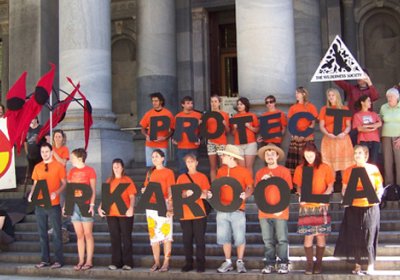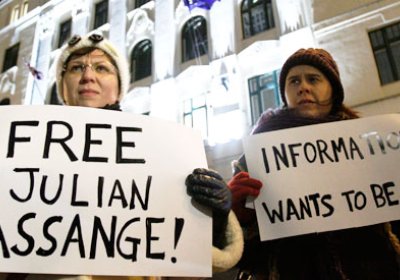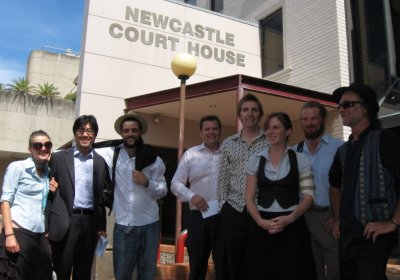At a packed Leichhardt Town Hall candidates meeting on February 7, education minister Verity Firth all but conceded that the Labor state government would not be returned on March 26.
Firth said she was looking forward to rebuilding the ALP from the opposition benches. She was unconvincing.
Firth told the meeting she joined the ALP when she was a 15-year-old idealist. “Genuine lasting change is about more than slogans,” she said.
“When you’re in government you cannot just issue a press release or organise a protest rally ... because governing is far more complex.”
Australia
For communities affected by Cyclone Yasi and the recent floods across Queensland, Western Australia, NSW, Victoria and Tasmania, it will be no comfort to hear that the Fair Work Act provides little protection for workers from unscrupulous employers.
Many bosses will choose to stand workers down without pay if their business is affected by these natural disasters.
At the height of the Queensland floods, state Workplace Rights Ombudsman Don Brown told ABC Online on January 21 that employers have the right to not pay workers for time off caused by the floods.
More than 400 people attended a February 7 forum that condemned the federal government’s intervention into Aboriginal communities in the Northern Territory.
The forum was organised by Concerned Australians. It coincided with the launch of a public statement addressed “to the people of Australia” by seven Indigenous elders. The statement asked for support to “help to put an end to the nightmare that Northern Territory people are experiencing on a daily basis”.
It isn’t often that socialists, Greens, Liberals and NGOs agree on an issue. But that is the case regarding uranium exploration in the Arkaroola region in the Flinders Ranges, 700 kilometres north of Adelaide.
Marathon Resources announced on February 7 that the South Australian Labor government had renewed the company's mining licence in Arkaroola.
The Arkaroola area is a unique environment, unlike anywhere else on Earth. It has over 160 species of birds, is home to species of fauna found nowhere else in the world and is a sanctuary for the endangered yellow-footed rock wallaby.
In the space of a few weeks, Australia and the world have been rocked by devastating weather events, from huge snowstorms across the US to flash flooding and cyclones in Australia. Many of these events have not just been catastrophic, but have set new records for weather.
Let’s pause to list some of the recent extreme weather events in Australia:
· Serious and long-lasting floods in Queensland around Rockhampton.
· Unprecedented flash flooding in Toowoomba and the Lockyer Valley.
· The biggest floods on record in western Victoria.
· A 100-year record flood in Brisbane.
Across Australia, moves are afoot to pass bills to legalise same-sex marriage.
The Tasmanian Greens were first to introduce such a bill in 2008. Greens leader Nick McKim introduced the bill again in November.
The Tasmanian ALP was the first state Labor branch to announce its support for same-sex marriage, but this has not led it to support the Greens’ bill.
ABC news reported on November 7 that former Tasmanian Labor premier David Bartlett said: “I have personally no opposition to same-sex marriage in Australia, but I see it as a purview of the federal parliament.”
The Sydney Peace Foundation awarded its “gold medal for peace with justice” to WikiLeaks editor-in-chief Julian Assange on February 2 in recognition of his “exceptional courage and initiative in pursuit of human rights”.
This award is different from the foundation’s annual Sydney Peace Prize. The foundation has awarded the gold medal on only three previous occasions: the Dalai Lama in 1998; Nelson Mandela in 2000 and Japanese lay Buddhist leader Daisaku Ikeda in 2009.
As category five tropical cyclone Yasi approached the north Queensland coast on February 3, a political cyclone was already sweeping Egypt. For days, Australian TV news was dominated by these two stories.
Incredibly, in Egypt the main government TV station news failed to report the fact that millions of Egyptians had taken to the streets in a huge February 1 protest against the Hosni Mubarak dictatorship.
Hiding the truth is what you’d expect from an iron-fisted dictatorship that has long sub-contracted its services to the CIA to torture victims of the “war on terror”.
Seven climate activists who temporarily shut down coal loaders at Newcastle harbour in a September protest will wait another month to find out if they owe Port Waratah Coal Services (PWCS) $525,000 in “compensation”.
The activists appeared in Newcastle Local Court for two days of hearings on January 31 and February 3. They were convicted of “remaining on enclosed lands”.
Each was fined $300, plus $79 in court costs.
As momentous events in Egypt demonstrate, much of the world is calling to account an “old order”. These are exciting times for the possibilities of real change in the way our societies are run.
One of the catalysts of the “people power” we see on our TV screens is the extraordinary disclosure of secret information that tells us how wars begin and governments manipulate and deceive in our name.
In the tradition of courageous investigative journalism, WikiLeaks has blown the whistles that alert us to these injustices and lies, serving a basic democratic need.
New federal drug laws could make thousands of native and common garden plants illegal.
The proposed legislation will place common plants under schedule II of the drug code along with plants such as marijuana and opium poppies.
The most worrying aspect of the legislation is the sheer number of plant species that will be made illegal.
Many of the substances produced by the plants are already illegal to manufacture or consume. However, there is not any significant market for making drugs from these plants and they are not sold or produced by organised crime.
Heavy-handed policing in Sydney over the past few months may indicate a heightened, anti-protester attitude of NSW police.
States and territories across Australia have either a “permit” or “notice” procedure for holding protests.
NSW law has the “notice” procedure, which is very favourable for those organising protests. The completion of a simple form, given to the police with seven days’ notice, protects activists from arrest for offences like obstructing traffic.
This favourable legal situation no doubt frustrates police, who are using more aggressive means to curb protests.
- Previous page
- Page 843
- Next page










